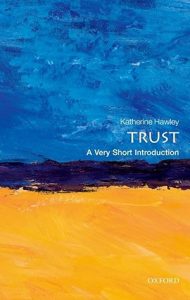Trust: A Very Short Introduction

Author: Katherine Hawley
Publisher: Oxford University Press
Year of Publication: 2012
Print Length: 144 pages
Genre: Non-Fiction / Popular Science, Philosophy
Topic: Trust, Ethics & Morality, Accountability, Domestic & Public, Governance, Politics & Power, Scholarship & Knowledge, Nation-Building & Nationhood
Trust is indispensable, yet it can be dangerous. Without trusting others, we cannot function in society, or even stay alive for very long, but being overly-trustful can be a bad strategy too. Trust is pragmatic, but it also has a moral dimension: trustworthiness is a virtue, and well-placed trust benefits us all.
In this Very Short Introduction, Katherine Hawley explores the key ideas about trust and distrust. Considerings questions such as ‘Why do we value trust?’ and Why do we want to be trusted rather than distrusted?’, Hawley raises issues about the importance of trust in both the personal and public spheres, including family and relationships as well as politics and society.
ABOUT THE SERIES: The Very Short Introductions series from Oxford University Press contains hundreds of titles in almost every subject area. These pocket-sized books are the perfect way to get ahead in a new subject quickly. Our expert authors combine facts, analysis, perspective, new ideas, and enthusiasm to make interesting and challenging topics highly readable.
Table of Contents
Acknowledgements
List of illustrations
Introduction: Trust and distrust at the breakfast table
1. What are trust and distrust?
2. Why trust and trustworthiness matter
3. Evolving trust and cooperation
4. Take the money and run
5. Honesty and dishonesty
6. Knowledge and expertise
7. Trust on the internet
8. Institutions, conspiracies, and nations
Afterword: The importance of being trustworthy
Further reading
Index

Katherine Hawley was a philosopher working in Metaphysics, including impostor syndrome, identity, time, parthood and social metaphysics; Epistemology, including applied and social epistemology; and Ethics, including trust, distrust and trustworthiness. She was a professor of philosophy at the University of St Andrews, Scotland. She holds a B.A. in Physics and Philosophy from the University of Oxford, and an M.Phil. in History and Philosophy of Science from the University of Cambridge; she obtained her Ph.D., also from the University of Cambridge, in 1998. Professor Hawley authored ‘How Things Persist’ (2001), ‘Trust: A Very Short Introduction’ (2012) and ‘How To Be Trustworthy’ (2019), all published by Oxford University Press.
Source: https://rse.org.uk/fellowship/professor-katherine-hawley/ & https://www.psychologytoday.com/intl/contributors/katherine-hawley-phd
More from Katherine Hawley in this library, click here.
